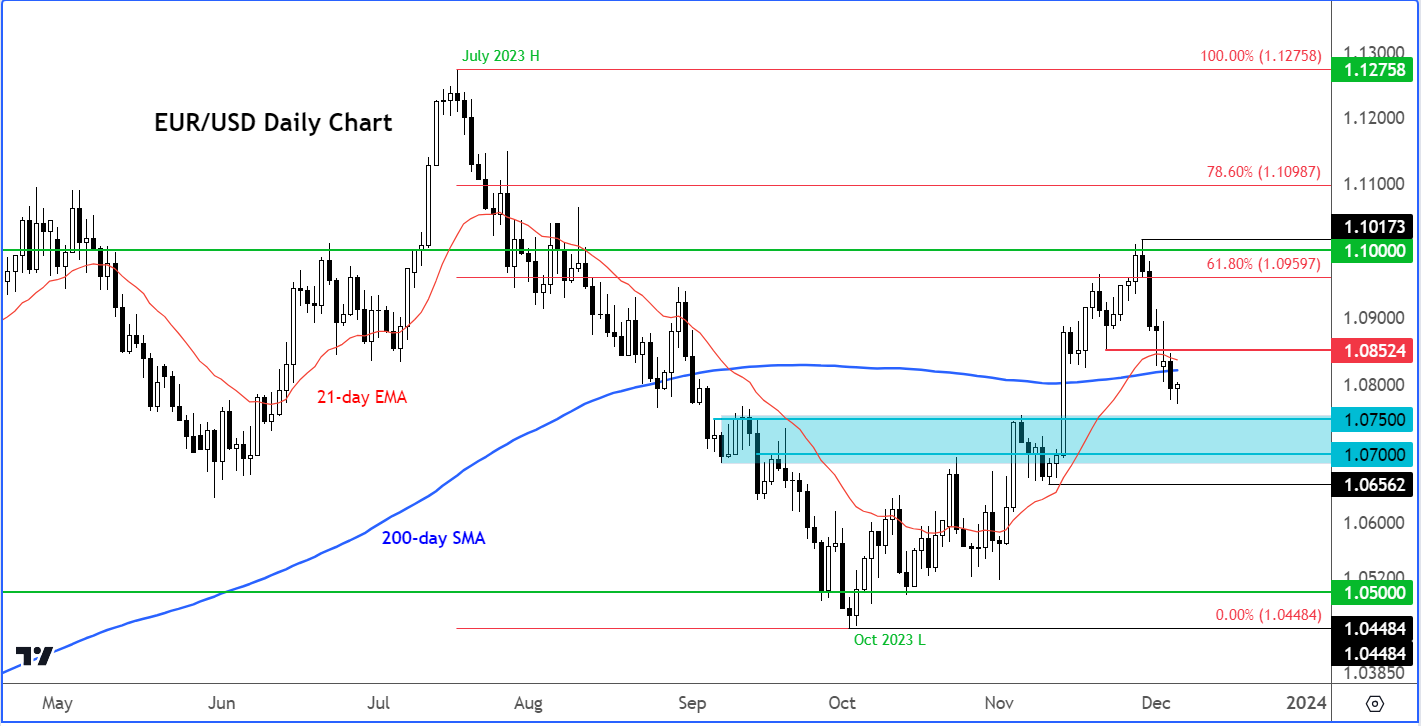The EUR/USD faces a key test in the next week and a half. We will have lots of key data and rate decisions from both the Federal Reserve and European Central Bank to come during this period. Ahead of these big events, the EUR/USD was down for the second consecutive week, eating into the impressive gains made last month. But will it bottom around the 1.0700-1.0750 key support area?
Dollar firms as investors eye key US data
So far this week, the US Dollar Index was holding into the positive territory, driven primarily by a weaker EUR/USD exchange rate, which was down for the second consecutive week at the time of writing, albeit off its lows. The DXY has also been underpinned by weakness in other major currencies this week, including the GBP, JPY and CAD, among others.
The US dollar was left largely unscathed following Tuesday’s conflicting US data releases. October's unexpected drop in JOLTS job openings further fuelled speculation of future Fed rate cuts, but the more up-to-date ISM services PMI data in November, which was stronger than expected, provided a counter move.
Wednesday’s release of ADP data was a potential source of volatility for the dollar. Needless to say, it didn’t react much to the smaller-than-expected rise in ADP (NASDAQ:ADP) private payrolls (103K vs. 130K expected). ADP tends to lack predictive power as it has proven to be a poor indicator of the official jobs report that usually comes out two days after, although markets do occasionally react to out-of-consensus numbers.
Heading into the busier second half of the week for US data, the dollar thus remained supported, as investors were taking a less aggressive stance in foreign currencies given mixed signals about the US economy.
As there will be no further updates from Federal Reserve officials until the conclusion of the next FOMC meeting on December 13, incoming data releases will provide the main source of direction for the dollar.
The big events are on the last day of this and Wednesday of next week. That’s when we have key US nonfarm payrolls figures and the Fed’s policy meeting, respectively. Ahead of these big events, the market may lower its rate-cut bets if the other data releases in between fail to worsen materially.
Euro undermined by dovish ECB, weak data
The euro has been coming under renewed pressure over the last couple of weeks, ever since the EUR/USD momentarily breached the 1.10 handle. It has fallen over 200 pips from there in subsequent days, with minimal pullback. Correspondingly, the DAX has risen to hit fresh record highs this week.
The German index was at it again on Wednesday, when it reached unchartered territories above July’s peak of 16532. These moves appear to have been triggered by a growing belief that the ECB will soon cut interest rates, having concluded the rate-hiking cycle.
We have seen some rather dovish comments of late by ECB officials, while data has remained soft throughout the year, and it was again exemplified on Wednesday by an unexpected 3.7% m/m drop in German factory orders.
Meanwhile hawkish ECB hardliner Isabel Schnabel on Tuesday suggested that another rate hike was off the table and focused the discussion on rate cuts. As well as the EUR/USD, all other major euro crosses have also moved lower.
For the EUR/USD to find a new bottom, we will either need to see renewed weakness in US data and a dovish Fed next week or a marked improvement in European data. The former scenario looks the more likely scenario for EUR/USD bulls.
This makes it difficult to call the bottom in the EUR/USD until at least the Fed’s meeting is out of the way next week, when we also have the ECB’s final rate decision of the year.
EUR/USD technical analysis
Even though the EUR/USD has now pulled back quite a bit over the last several days following an impressive rally last month, the abovementioned factors make me reluctant to call for the bottom just yet. Considering the euro's bearish momentum, I think there is a risk for a modest further decline in the EUR/USD heading into the FOMC meeting.
The key potential support area to watch is in the range starting around 1.0750 to 1.0700. This area had previously been resistance. So, it will be interesting to see whether the bulls will hold their ground, should we get there, or we will it slice right through it.
A bullish-looking candle needs to form around these levels for the bulls to get excited again. Meanwhile, resistance is seen around 1.0850ish – a move back above this level would make things look a lot different, for then we will have also reclaimed the 200-day average again.

